It’s a Tortoise Battlefield
The war in Iraq may be thousands of miles away and across one good-sized ocean, but there’s another scuffle going on over desert lands that are closer to home. U.S. soldiers are in a territory dispute with one of the Mohave’s oldest inhabitants: California Tortoises.
LA Weekly reports that after years of coexisting with these slow-moving, gentle animals—listed as threatened under federal and state endangered species acts—the U.S. military at Fort Irwin, California, has taken measures to airlift these native tortoises to another section of the Mojave, more than 20 miles from their home.
|
The tortoises, who in recent decades thrived on the restricted-access lands, are now having to survive on foreign grounds in a much busier, more unstable, and completely unfamiliar environment. Plus, they’re now at a greater risk of danger from vehicles, hikers, campers, and mines.
Way back in 1994, the U.S. Fish and Wildlife Service developed a Desert Tortoise Recovery Plan, which led to the construction of six critical habitat areas—and guess what? One of those habitats consists of much of the land currently occupied by Fort Irwin—and the land Fort Irwin wants.
The reason for relocating these reptiles? Military folks at the southern California training base need more land space to play their war games. Fort Irwin is a Hollywood-built Iraq—it’s a perfect replica, complete with actors who portray shepherds, prisoners, lawyers, and any other individuals who stroll the Iraqi streets.
With all the strategizing, simulating, role-playing, and lifesaving training going on—not to mention the bottomless pit of cash the military seems to be harboring—the military should at least take a few moments to teach their soldiers compassion for all living creatures and be able to devise a better plan for the safety of these animals.
In an attempt to halt expansion plans, the Center for Biological Diversity filed a federal lawsuit against the Army and the Bureau of Land Management. This battle is sure to continue, and we’ll be on guard.
Written by Jennifer Cierlitsky


